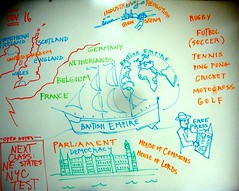The UK, says Wikipedia, has the world's sixth largest economy by nominal GDP and the sixth largest by purchasing power parity.
It was the world's first industrialised country[19] and the world's foremost power during the 19th and early 20th centuries,[20] but the economic and social cost of two world wars and the decline of its empire in the latter half of the 20th century diminished its leading role in global affairs.
The UK nevertheless remains a great power with leading economic, cultural, military, scientific and political influence. It is a recognised nuclear weapons state while its military expenditure ranks third or fourth in the world, depending on the method of calculation.[21]
The UK-led Industrial Revolution, in the late 1700's and early 1800's, transformed the country and fuelled the growing British Empire. During this time the UK, like other great powers, was involved in colonial exploitation, including the Atlantic slave trade, although with the passing of the Slave Trade Act in 1807 the UK took a leading role in combating the trade in slaves.[32]
After the defeat of France in the Revolutionary and Napoleonic Wars (1792–1815), the UK emerged as the principal naval and economic power of the 19th century (with London the largest city in the world from about 1830 to 1930)[33] and remained a foremost power into the mid 20th century.[34]
Beside Russia, France and (after 1917) the USA, the British were one of the major powers opposing Germany and its allies in World War I (1914–18).[35]
The nation suffered an estimated two and a half million casualties and finished the war with a huge national debt.[36] After the war the United Kingdom received the League of Nations mandate over former German and Ottoman colonies and the British Empire had expanded to its greatest extent, covering a fifth of the world's land surface and a quarter of its population.[37]
The Great Depression (1929–32) broke out at a time when the UK was still far from having recovered from the effects of the war and led to hardship and political and social unrest.[38]
The United Kingdom was one of the three main Allies of World War II. Following the defeat of its European allies in the first year of the war, the United Kingdom continued the fight against Germany, which took form in these years with the Battle of Britain.
After the victory, the UK was one of the Big Three powers that met to plan the postwar world. The war left the United Kingdom financially damaged. However, Marshall Aid and loans taken from both the United States and Canada helped the UK on the road to recovery.[39]
skip to main |
skip to sidebar
For students and parents who love education and exploration of the social sciences . . .
Search This Blog
Followers
Blog Archive
-
▼
2010
(346)
-
▼
November
(24)
- Reading and reporting about France in World Geo, p...
- Indie work: Make a Quiche Lorraine to be sampled b...
- One of man's most ancient sources of protein: esca...
- The French and advanced technology
- Western Europe / France / Monuments of Paris project
- Nature trail hike on the perimeter of the Magnet c...
- Weather permitting, classes will take an instructi...
- Learning the map of the UK via symbols
- The Yankee states and the Big Apple test / Trudeau
- Small group tutoring - Writer's Workshop on Thurs ...
- Indie essays on England
- Norton Commando 850 / British motorcycles
- England was part of the Roman Empire; they called ...
- Iron & steam: the Industrial Revolution began in E...
- The modern history of the United Kingdom, aka Grea...
- NE states & Manhattan test next class
- The Thames, the Tower Bridge and the Tower of Lond...
- Britain and neighbors, the Western European nations
- West Side Story / Puerto Rico: US Possession conne...
- NYC: the Erie Canal and the Broadway show, "Annie"
- What to know about NYC
- Historic Manhattan: the Chrysler Building, New York
- Choices available in Indie essays
- Map quizzes: the twelve Midwest states followed by...
-
▼
November
(24)

